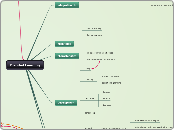Blended Learning
integration of:
Classroom f-2-f learning
course redesign process
refine course objectives
refine assessment strategies
capture the best practices of the course
multi-media lessons
video
interactive learning objects
brief assessments with feedback
sample essays
brief readings that require response
mobile learning
Online Learning
Main topic
characteristics
limiteless in time and space
to a large amount of learners
development
policy
planning
strategic planning
operational planning
resources
financial
human
technical
scheduling
support
course development team
instructor: content expert
instructional designer: assistant in course design
media specialist: course materials' technical creation and support
adoption
variation theory of learning
Teaching and Learning
concepts and principles of T&L
teaching/instruction
instructional model
course modules
classroom management
create postive learning environment
teacher's attributes and quality
manage learning activities
manage pupil's misbehaviors
school practice and support
instructional process
instruction techniques
lectures
activity-based learning
work-based learning
collaborative learning
problem-based learning
action learning
demonstration
game
active learning
contextual learning
social learning
delivery methods
classroombased,
instructor-led f-2-f
E-Learning
technology-enhanced learning
online learning
blended learning
portable
technologies
PDA
mobile phone
iPad
Others
on-the-job training (OJT)
satellite video broadcast
text-based training
other options
learning
Learning Strategies
discussing
relating
demonstrating
evaluating
Learning Skills
Higher Order Thinking
critical thinking
Student Experience
course content and structure
usability and reliability of technology
help and support
tutor support
overall online experience
Learning Styles
Kolb's
diverging (CE/RO)
assimilating (RO/AC)
converging (AC/AE)
accomodating (CE/AE)
Learning cycle
Kolb's
concrete experience (CE)
reflective observation (RO)
abstract conceptualization (AC)
active experimentation (AE)
From Wikipedia
Engage
Explore
Explain
Extend
Evaulate
